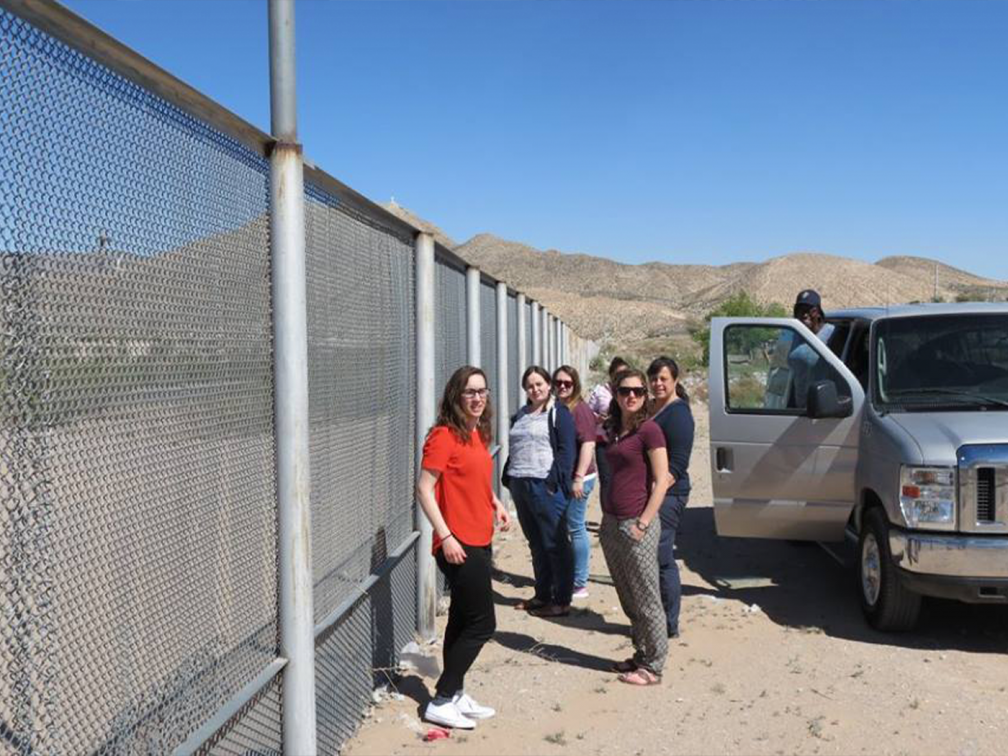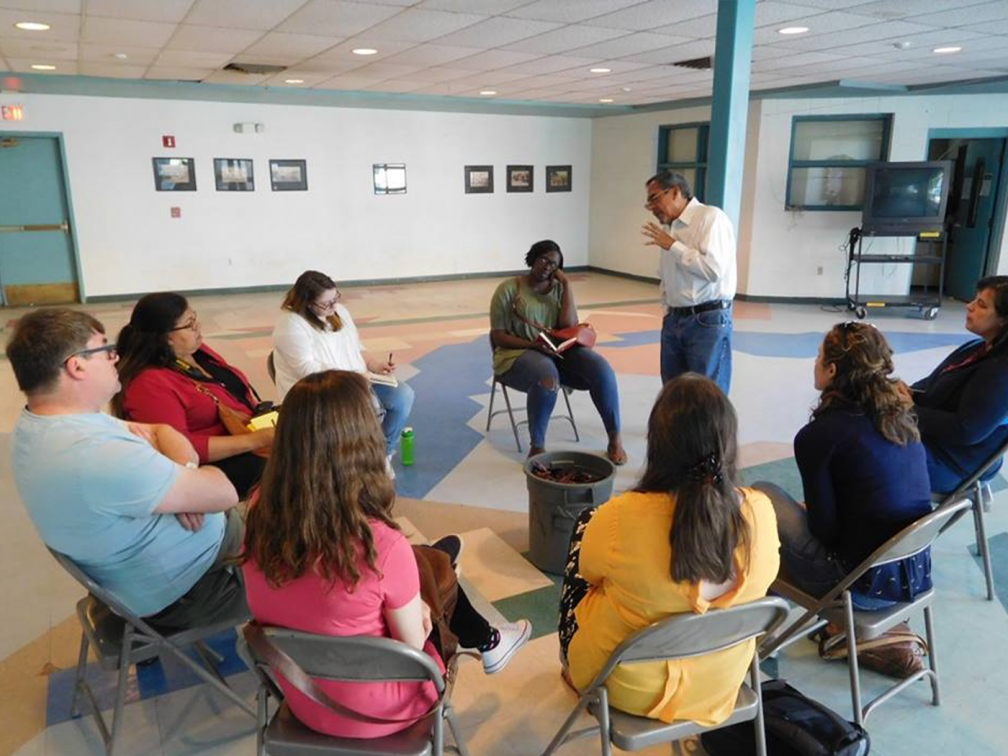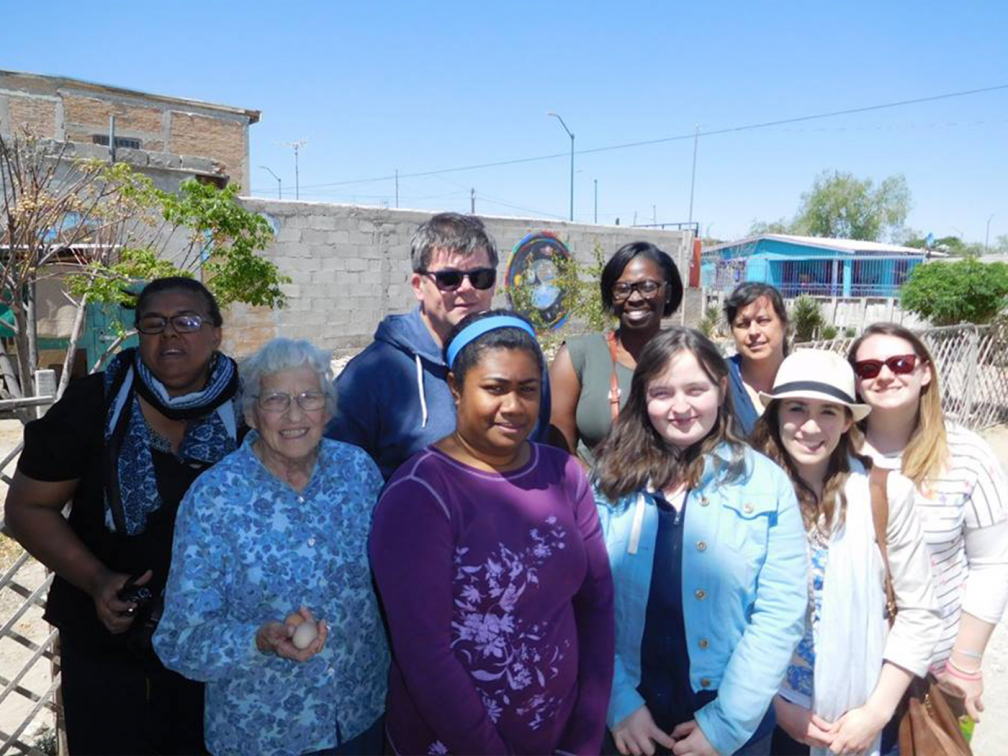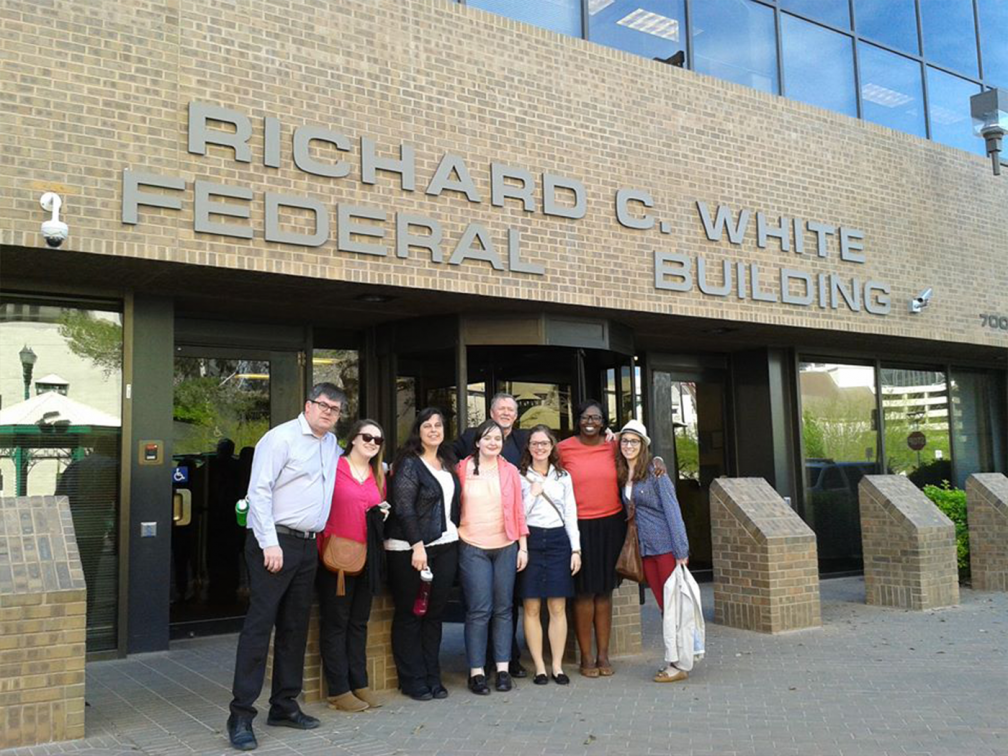The cities of El Paso, Texas and Ciudad Juárez in Mexico occupy positions geographically only 200 metres apart. However for those living there, and particularly for those living on the Mexican side of the border, the presence of the 18 foot high fence that runs some 1,954 miles along the border between the two countries, separating these communities, dominates their lives and ensures their experiences and opportunities to live with even the most basic of human rights is very different.
Whilst participating in the visit, the group were given the opportunity to meet with many inspiring people as well as sharing the Easter liturgies with these communities. Perhaps one of the most memorable experiences for the group was staying overnight in Rancho Anapra and then sharing with them the Good Friday ‘Via Crucis’, or ‘way of the Cross’. For this community, the poorest of the poor and on the edge of the city only recently dubbed the ‘deadliest city on earth,’ daily life is a struggle. You might expect a fear of strangers and a lack of willingness to be seen in large numbers. Instead thousands took part in the procession up Mount Anapra, greeted their visitors as friends and showed, like I have never experienced before, a real understanding of Christ’s suffering and the meaning of resurrection.
1. Jesus Is Condemned to Death
The ‘undocumented’, the ‘voiceless’ – Contrary to the very vocal statements of some candidates in the American election, and some of the press statistics, those who migrate across borders to find sanctuary and a new home are hard working and are far less likely to commit crimes than those born in that country.
Am I prepared to speak out against false accusations and put people right when they speak inaccurately about migrants and those seeking asylum?
2. Jesus Takes Up His Cross
Carlos Marentes is the Director of the Border Farm Workers Centre in El Paso. A little known fact is that thousands of workers cross the border legally to work on the farms on the USA side of the border each year. For these men and women, life is immensely hard. Their annual wage is less than $6,000, which is far below the US federal poverty income guidelines. They rise each morning just after midnight, after only 3 hours sleep, to search for work to feed their families who they rarely see. It is back breaking work. Carlos supports these people by providing them a simple place to sleep, a meal each night and by educating groups about the human cost of the West’s demands for cheap food.
Do I know the human cost of the food I eat? How do I choose what I buy?
3. Jesus Falls the First Time
Together with her colleagues, Taylor Levi from the Las Americas Immigrant Advocacy Centre, gives free or very cheap legal services for low-income immigrants and acts as an advocate for human rights.
4. Jesus Meets His Sorrowful Mother
Sister Betty Campbell has lived amongst the community of Juarez throughout the recent troubles. Now in her mid eighties, she makes it her work to remember the sons and daughters who have disappeared without trace, or whose bodies have been found on the streets, killed by the drug cartels because their mothers couldn’t pay the protection money demanded. Alongside her colleague for over 40 years, Fr. Peter Hindes, she campaigns for a change in US policy which has allowed drug lords to prosper in the region as they supply the country’s growing drug trade, whilst giving many impoverished young people little alternative to a life of crime.
5. Simon of Cyrene Helps Jesus Carry the Cross
Columban Fr. Kevin Mullins, pastor of Corpus Christi Church in Anapra has walked along side his parishioners for the last 14 years. The Australian born priest, who on 3 separate occasions has come close to death, has built up his church community from a congregation of little more than 30, in the beginning, to a regular congregation of many hundreds now. He greets many of his parishioners before Mass with a hug or a wink. To prevent his young parishioners being attracted to the lure of the cartels, he has recently completed the building of a youth centre on waste land behind his church where two of his former confirmation class were stoned to death. Two of the many parishioners he has had to bury during the violence.
How do I walk alongside the poor and marginalised?
6. Veronica Wipes the Face of Jesus
Shalini Thomas works for the Diocesan Migrant and Refugee Services. She spends her days supporting those who are beginning the long journey to apply for residency, citizenship or asylum in the USA as part of the complicated world of legal documentation and endless rules which are the first steps in a long and difficult journey for many who are fleeing death threats and poverty in Latin America.
Can others see the face of Jesus in me?
7. Jesus Falls a Second Time
The ‘criminalised.’ In the Federal Immigration Court we saw a judge dealing with 50 cases a day. Each case was simply a number. Whilst the judge tried his best to make things clear, many defendants didn’t understand what was going on, couldn’t afford an attorney, or had an attorney who was so over worked that he couldn’t find their papers. The judgement was usually for ‘removal’. There was little time to hear the individual’s story.
Do I take the time to get to know those who have come to this country? Do I know their story?
8. Jesus Meets the Women of Jerusalem
Ruben Garcia founder of Annunciation House El Paso, with its motto ‘Voice of Voiceless’ runs border awareness experiences for groups from across the world. He also accompanies migrants, the homeless and economically vulnerable peoples of the border, and has done since 1978. Ruben reminds groups that the poor do not ask for our sympathy, but to change our behaviour, since their suffering is a direct result of economic policies in the West.
Am I prepared to question my own behaviour which supports policies and behaviour that continue to make the world unfair for so many?
9. Jesus Falls the Third Time
The economic system in Mexico has little or no room for unskilled workers, especially those over 50. Members of the Women’s Cooperative of Hope and Faith make hand-designed textile products and the money raised augments the salary received from working family members and allows families to live with dignity.
10. Jesus Is Stripped of His Garments
The workers of the maquiladoras, or factories across Juarez, are denied basic rights, refused union representation and live on a wage 10% of that paid just a few miles away across the border. Their wage will only buy a quarter of the basic necessities that are essential for a typical worker’s family. The employers only recruit young women since they are capable of working much longer hours than those who are older. Their work is to produce products demanded cheaply by the the West, whilst the hazardous waste from this production is left in Mexico.
Do I consider where and how the things I buy were made? Do I buy Fair Trade products whenever possible?
11. Jesus Is Nailed to the Cross
Rosa (not her real name) and her family fled their homeland after the death of her brother and sister in Mexico at the hands of the cartel. Her son’s life was threatened because he witnessed who killed them. The family fled across the border for safety but live in constant fear of arrest as ‘undocumented’ people. They suffer abuse and violence in their new homeland.
Do I welcome the stranger?
12. Jesus Dies on the Cross
Molly Molloy, research librarian and border specialist at New Mexico State University has, since 2008, provided detailed documentation of the 11,000 people murdered in Juarez since that date. She continues to question the effectiveness of the Government in solving these murders, the vast majority of which go uninvestigated.
13. Jesus Is Taken Down From the Cross
The Young Adult Ministry of El Paso is a wonderful group of young men and women who have studied hard to ensure they can help support their families, live and work on both sides of the border. They meet each week to support one another and improve the community. They often pray together and destroy the myth that migrants are a burden on the community. Their friendship and generosity to us was a clear sign of those working for a better future.
Do I label people?
14. Jesus Is Laid in the Tomb
Those in detention centres are often seeking safety and sanctuary but find themselves treated as criminals, locked away and separated from their wives and children. The detention centres are usually located away from the major cities, and visiting them is strongly discouraged.
Do I want the issue of migrants to just go away? Am I frightened to speak out against injustice, but would rather go along with what most people say. Like Joseph of Arimathea, do I hide my faith?
15. The Resurrection
Pope Francis, in response to suggestions that the border fence between the USA and Mexico should be replaced by a 30 foot wall, said; “A person who thinks only about building walls, wherever they may be, and not building bridges, is not Christian.” Pope Francis made this remark on his way back to Rome from Mexico after having celebrated Mass in Juarez beside the border fence. We witnessed so many people this Easter who work tirelessly to build such bridges.
Do I allow my Christian faith to influence the decisions I make? Do I build bridges or walls?




